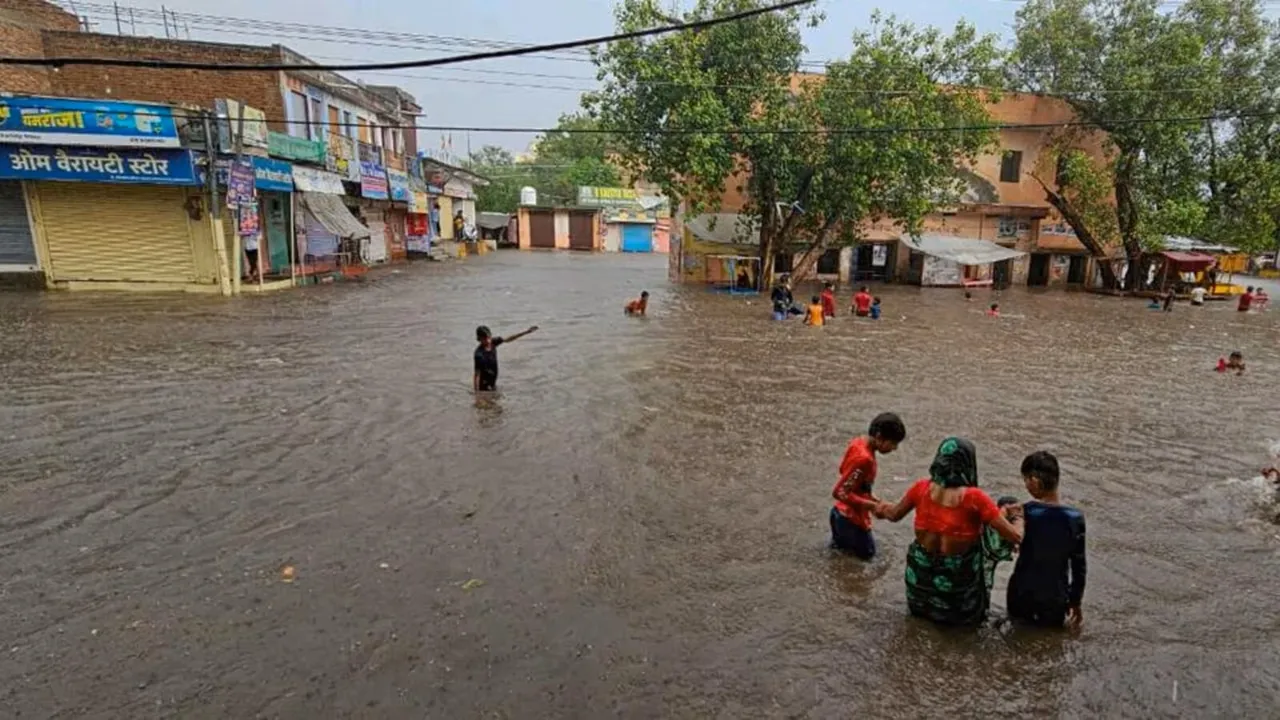


Daily life in Rajasthan is disrupted as a Western Disturbance brings rainfall and a dip in temperatures, with dense fog blanketing several areas. The India Meteorological Department (IMD) has issued an orange alert for 15 districts and a yellow alert for six, warning of persistent dense fog for the next three days. The adverse weather has caused travel difficulties and disrupted daily activities, with residents advised to stay updated on weather advisories and take precautions.
Winter Weather Wreaks Havoc in Rajasthan: Dense Fog and Rainfall Disrupt Daily Life
Background:
Rajasthan, a vast state in northwestern India, is known for its extreme weather conditions, characterized by hot summers and cold winters. During the winter months, the state experiences a phenomenon known as a "Western Disturbance," which is a weather system originating from the Mediterranean Sea that brings rainfall and a dip in temperatures to the region.
Current Situation:
As of January 10, 2023, a Western Disturbance has brought heavy rainfall and dense fog to Rajasthan, leading to widespread disruptions in daily life. The India Meteorological Department (IMD) has issued an orange alert for 15 districts and a yellow alert for six, warning of persistent dense fog for the next three days.
The fog has caused significant travel difficulties, with visibility reduced to near zero in several areas. Road, rail, and air traffic have been affected, leading to delays and cancellations. In addition, the cold weather has caused a spike in respiratory and cardiovascular ailments among the population.
Impact on Daily Life:
The adverse weather conditions have disrupted daily activities for residents of Rajasthan. Schools and colleges have been closed, and outdoor events have been postponed or canceled. Residents have been advised to stay updated on weather advisories and take precautions, such as wearing warm clothing and avoiding unnecessary travel during foggy conditions.
Top 5 FAQs:
1. What is a Western Disturbance?
A Western Disturbance is a weather system that originates from the Mediterranean Sea and brings rainfall and a dip in temperatures to northwestern India during the winter months.
2. Why is the fog so dense in Rajasthan?
The fog in Rajasthan is caused by a combination of factors, including low temperatures, high humidity, and the presence of pollutants in the atmosphere.
3. How long is the fog expected to last?
The IMD has issued alerts warning of persistent dense fog for the next three days. However, the duration and intensity of the fog may vary depending on the weather conditions.
4. What are the health risks associated with the fog?
Exposure to dense fog can aggravate respiratory and cardiovascular conditions, especially among vulnerable populations such as the elderly, children, and those with existing health problems.
5. What precautions should residents take during the foggy weather?
Residents are advised to stay updated on weather advisories, wear warm clothing, avoid unnecessary travel during foggy conditions, and seek medical attention if they experience any respiratory or cardiovascular symptoms.

A stampede at the Kasibugga Venkateswara Swamy Temple in Andhra Pradesh has left 10 dead and two injured. The temple had recently reopened and was experiencing high footfall due to a festival. Home Minister Vangalapudi Anitha has ordered a thorough investigation into the causes of the tragedy and has promised strict measures to prevent similar incidents in the future.

India and the United States have strengthened their already strong ties by signing a 10-year framework for their major defense partnership. The agreement, signed during a bilateral meeting between the two countries' defense ministers, emphasizes the importance of this partnership in maintaining a free and open Indo-Pacific region. This marks a significant step in solidifying the bond between India and the US in the defense sector.

In preparation for a major tri-service military drill, India has issued Notices to Airmen (NOTAM) for the entire northeastern region that borders China, Bhutan, Myanmar, and Bangladesh. The first set of exercises will commence in November and continue through January, signaling enhanced operational readiness for the Indian Air Force (IAF). This move is significant as the Northeast remains a sensitive theater, making up the boundary with four countries, including China. The upcoming IAF exercises aim to strengthen India's air dominance, effectively preparing for any potential challenges along the western frontier with Pakistan.

India will conduct a 10-day military exercise in Rajasthan and Gujarat involving the Army, Air Force, and Navy to showcase its operational readiness following Operation Sindoor earlier this year. The exercise, announced through a NOTAM, features advanced military technologies and emphasises the integration of speed, firepower, and precision in desert warfare conditions. It comes amidst heightened tensions with Pakistan and a renewed focus on maintaining military readiness along the border.

Jammu and Kashmir police have filed an FIR against a group of Christian missionaries in Kathua district for allegedly attempting religious conversions through financial incentives. This comes after a video surfaced online showing the missionaries being attacked and their vehicle vandalized by villagers. The incident has sparked outrage and protests from local Hindu groups, demanding action against the accused missionaries. One accused, Ravindra Singh Thela, has been arrested while the main accused, Vivek Soni, is still at large. The police have also suspended eight personnel for failing to stop the attack.

US Vice President JD Vance, who converted to Catholicism in 2019, has revealed that he hopes his Hindu-raised wife, Usha Vance, will eventually embrace Christianity. However, he clarifies that their interfaith marriage is built on mutual respect and understanding, and that Usha has complete freedom of choice in matters of faith. The couple has found a balanced way to manage their interfaith household, with their children attending a Christian school and given the choice to be baptized.

US President Donald Trump has expressed optimism about reaching a trade deal with China "pretty soon" after a meeting with Chinese President Xi Jinping in South Korea. In addition to announcing lower tariffs on Chinese imports, Trump also stated that the issue over US access to rare earths has been resolved. However, there has been no official response from Beijing and the final decision on the sale of Chinese-owned TikTok's US operations is still pending. Analysts see these developments as a breakthrough in the ongoing trade tensions between the two countries. Our correspondents provide insight on the discussions between the two leaders and speculate on why Xi may have felt confident walking into the meeting.

At the Asia-Pacific Economic Cooperation (APEC) Summit in South Korea, Chinese President Xi Jinping and US President Donald Trump met for their first in-person talks in several years. Despite past frictions, Xi called for closer cooperation between the two largest economies in the world, emphasizing the importance of being "partners and friends." Acknowledging Trump's peace efforts in the Middle East, Xi commended his contributions and praised him as a "tough negotiator." Trump also expressed optimism for a productive discussion on trade and global security.

In a historic event, Prime Minister Shri Narendra Modi addressed the Global Maritime Leaders Conclave and chaired the Global Maritime CEO Forum at India Maritime Week 2025 in Mumbai, welcoming participants from over 85 countries. With major shipping giants, startups, policymakers, and innovators in attendance, the summit showcased India's advancements in the maritime sector, such as the replacement of outdated colonial laws with modern ones and the recognition of large ships as infrastructure assets. Amidst global tensions, India stands as a symbol of strategic autonomy and inclusive growth, ready to take on a leading role in the world's rough seas.

Indian Prime Minister Narendra Modi has declared that the next generation of Goods and Services Tax (GST) reforms will begin on the first day of the Navratri festival. This major economic overhaul aims to streamline the current GST system and support businesses, especially small and medium enterprises. In other news, the National Human Rights Commission (NHRC) and Ministry of External Affairs (MEA) are collaborating to organize a six-day program in New Delhi to strengthen executive capacity for International Technical and Economic Cooperation (ITEC). Lastly, the upcoming BIRC 2025 conference will take place at the Bharat Mandapam in New Delhi.